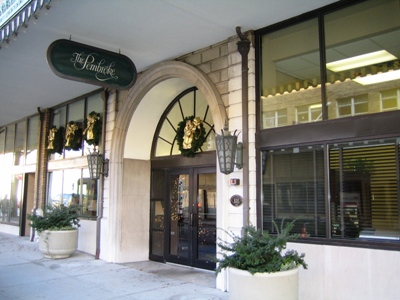 My imagination makes me human and makes me a fool; it gives me all the world and exiles me from it.--Ursula K. Le Guin |
 Union Avenue Union AvenueAn Urban Journal Exploring Place, Purpose, Literature, Memory, and This Time |
Journal Entries
|

December 30, 2009 - Louisa May Alcott, Who Knew? Last night, by delightful happenstance, I caught PBS' American Masters documentary of Louisa May Alcott. All of the American Masters' productions are...well, masterly, but this one, with dramatizations by Elizabeth Marvel and Jane Alexander and dialogue taken word-for-word from Alcott's letters and journals, was particularly mesmerizing. Little Women was probably 'the' book that triggered my love of reading. I read it later than most girls, I think about 11 or 12, because mine was not a bookish family. My parents only finished the sixth grade; even if they could have afforded them, it would never have occurred to them to give books even at Christmas. There was no public library nearby and no library in my grade school, but each classroom, each of which was a grade, had its own small collection of books, and that's where I found Alcott. Like countless little girls, I fell in love with the March family, and I wanted to be Jo March. I'm sure if I read the book today, I would love it as much. I always thought, though, that Louisa's life was pretty much like Jo's. I had no idea of the tragedies and suffering in her life, of the complex and unconventional personality of the woman who declared she was not keen on "writing moral pap for the young." Some of the surprising things I learned about Alcott: As a young child, Alcott and her family lived in a vegetarian commune begun by her Transcendentalist father, Bronson Alcott, and very nearly starved. Bronson's closest friends were Ralph Waldo Emerson, who shared his vast library with Louisa, and Henry David Thoreau, who taught her botany. She had mad crushes on both of them. Bronson, who failed miserably as a teacher, farmer, and lecturer, moved the family 30 times in five years. As a teenager, Alcott was forced to earn money at menial labor, working variously as a teacher, servant, seamstress, and laundress, but vowed to become rich through her true passion, writing: "I will take fate by the throat and shake a living out of her." And she did, earning the family's first real money with her "pot-boilers." "I think my natural ambition," she said, "is for the lurid side." At 30, as a volunteer nurse in a Georgetown hospital during the Civil War, she helped with the horrific casualties following the Battle of Fredericksburg, assisted amputations performed with saws and without anesthesia and tended many dying men. She caught pneumonia and typhoid fever and came home very ill. At 33, Alcott fulfilled her lifelong dream of seeing Europe when she traveled there as an invalid's companion. In Switzerland, she met a twenty-year-old, piano-playing Polish soldier, Ladislas Wisniewski, who would become the model for "Laurie" in Little Women. They shared a similar sense of humor and quickly bonded. Alcott left her job and to meet "Laddie" in Paris where they spent two weeks together. Did they have an affair? No one knows. In her journal she wrote "a little romance with Laddie," crossed out the next line and wrote in, "couldn't be." Oh, but she had Paris. If she also had romance, it was just icing on the gāteau. Alcott, who wrote in a vortex for days on end, barely eating and sleeping and stopping only for her daily run, and then suffered through bouts of depression, may have been bi-polar. Her health continued to decline after the typhoid fever, the result, she assumed, of the mercury she had been given as treatment. Medical researchers now say her physical ailments were most likely the symptoms of lupus--headaches, rashes, joint pain, digestive disorders. In trying to find relief, she experimented with hashish and became an opium addict. She died at age 55 of a stroke. Just two months before she wrote in her journal, "I look about 70, grey & wrinkled & bent & lame." But Jo March will never age and, although she may no longer impress today's young girls with her antic rebellion against social constraints, she will continue to inspire them to become writers, thespians, and independent careerists of all kinds. And I, who spent my first nine years in six rental houses with outdoor toilets and coal-burning stoves in the living rooms and not a single book except for an unread Bible, will always be grateful to Alcott for allowing me to enter the world of the March family. |